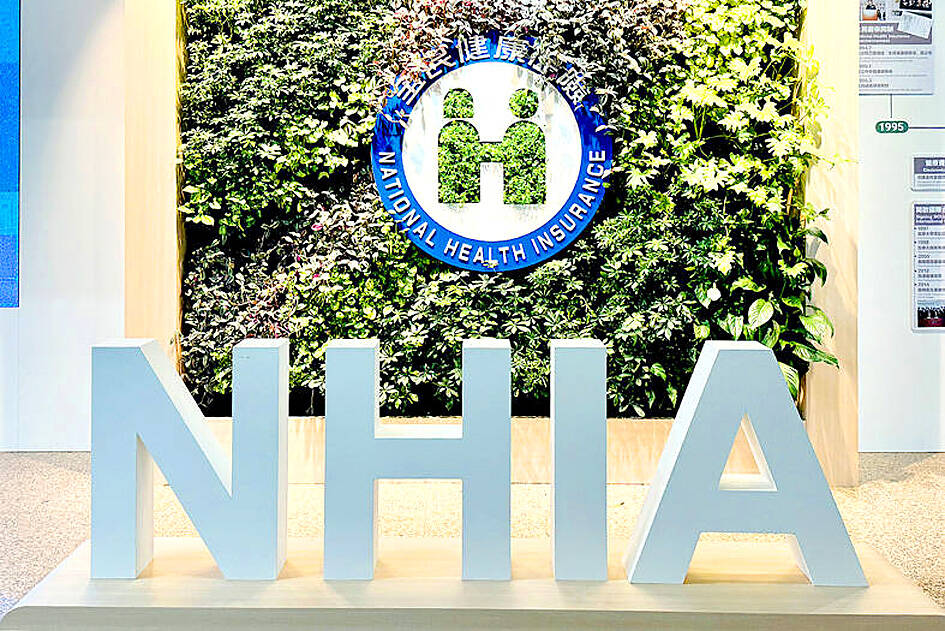The National Health Insurance Administration (NHIA) said it plans to expand the coverage eligibility for receiving a third-generation targeted drug for lung cancer patients with the epidermal growth factor receptor (EGFR) starting next month.
The eligibility would be expanded to include people with stage 3b EGFR-mutated lung cancer, which is expected to benefit about 4,000 people, allowing them to save about NT$1.15 million (US$36,005) per year in medical expenses.
The expanded eligibility is expected to cost the NHI program between NT$4.1 billion and NT$5 billion per year, and with the annual expense of about NT$3.3 billion on eligible patients, the targeted drug would be the most expensive single type of drug in NHI history.

Photo: Chiu Chih-jou, Taipei Times
Lung adenocarcinoma is the most common type of lung cancer in Taiwan and KRAS mutations occur in about 20 to 40 percent of lung adenocarcinomas in Western populations, NHIA Director-General Shih Chung-liang (石崇良) said.
However, in Taiwan, KRAS mutations only occur in about 8 to 10 percent of patients with lung adenocarcinomas, while EGFR mutations occur in about 55 to 60 percent of patients with lung adenocarcinomas, he said.
The NHI program since April 2020 has conditionally covered a third-generation targeted drug called Tagrisso (osimertinib) for the treatment of EGFR-mutated lung cancer, but the eligibility was reduced in April 2022, which had caused an uproar among patients and medical professionals.
Studies published in international journals have suggested that compared with the first-generation targeted drug, the third-generation drug can reduce the risk of mortality by 20 percent.
With many calls for the NHI program to expand eligibility, Shih said the administration plans to expand the eligibility of Tagrisso from its current eligibility of stage 4 (metastasized) lung cancer to include stage 3b EGFR-mutated lung cancer with local invasiveness or metastases.
The Pharmaceutical Benefit and Reimbursement Scheme Joint Committee has approved the expanded eligibility, and it is scheduled to take effect on Oct. 1 at the earliest, he said.
About 3,400 people are treated with Tagrisso each year, which is an NHI expenditure of about NT$3.3 billion per year, NHIA statistics showed. After the eligibility expansion, it would increase the expenditure to more than NT$7 billion.
The total expenditure for NHI-covered medical treatment last year was more than NT$24.3 billion, the highest among all cancer types, and drug fees accounted for NT$12.2 billion, with a five-year average growth rate of 12.7 percent.
Regarding people with lung cancer without gene mutations that cannot receive the targeted drug, Shih said specialists have suggested including immunotherapy drugs for treating metastasized small cell lung cancer in NHI coverage, so there might be good news after the agency negotiates with drug companies.
An estimated 272 to 359 patients each year are expected to benefit from it, allowing them to save about NT$1.45 million per person per year, he added.

Several Chinese Nationalist Party (KMT) officials including Chairman Eric Chu (朱立倫) are to be summoned for questioning and then transferred to prosecutors for holding an illegal assembly in Taipei last night, the Taipei Police said today. Chu and two others hosted an illegal assembly and are to be requested to explain their actions, the Taipei City Police Department's Zhongzheng (中正) First Precinct said, referring to a protest held after Huang Lu Chin-ju (黃呂錦茹), KMT Taipei's chapter director, and several other KMT staffers were questioned for alleged signature forgery in recall petitions against Democratic Progressive Party (DPP) legislators. Taipei prosecutors had filed

Taiwan would welcome the return of Honduras as a diplomatic ally if its next president decides to make such a move, Minister of Foreign Affairs Lin Chia-lung (林佳龍) said yesterday. “Of course, we would welcome Honduras if they want to restore diplomatic ties with Taiwan after their elections,” Lin said at a meeting of the legislature’s Foreign Affairs and National Defense Committee, when asked to comment on statements made by two of the three Honduran presidential candidates during the presidential campaign in the Central American country. Taiwan is paying close attention to the region as a whole in the wake of a

NEW WORLD: Taiwan is pursuing innovative approaches to international relations through economics, trade and values-based diplomacy, the foreign minister said Taiwan would implement a “three-chain strategy” that promotes democratic values in response to US tariffs, Minister of Foreign Affairs Lin Chia-lung (林佳龍) said. Taiwan would aim to create a “global democratic value chain,” seek to capitalize on its position within the first island chain and promote a “non-red supply chain,” Lin was quoted as saying in the ministry’s written report to the Legislative Yuan submitted ahead of the legislature’s Foreign Affairs and National Defense Committee meeting slated for today. The Ministry would also uphold a spirit of mutual beneficial collaboration, maintaining close communication and consultations with Washington to show that Taiwan-US cooperation

President William Lai (賴清德) has appointed former vice president Chen Chien-jen (陳建仁) to attend the late Pope Francis’ funeral at the Vatican City on Saturday on his behalf, the Ministry of Foreign Affairs said today. The Holy See announced Francis’ funeral would take place on Saturday at 10am in St Peter’s Square. The ministry expressed condolences over Francis’ passing and said that Chen would represent Taiwan at the funeral and offer condolences in person. Taiwan and the Vatican have a long-standing and close diplomatic relationship, the ministry said. Both sides agreed to have Chen represent Taiwan at the funeral, given his Catholic identity and